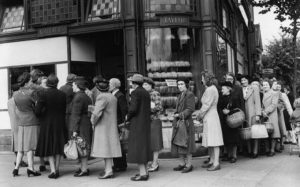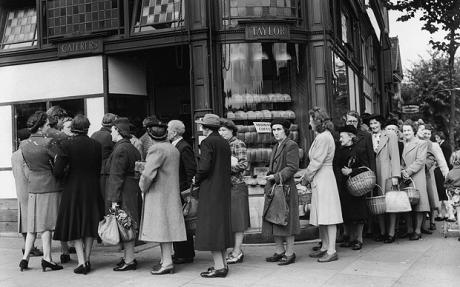I often find that great stories are not just about the writing, the plot or the characters, but what they tell us of the human condition. That is what really pulls me into the pages and makes me think about what I have read long after I finished the book. Stories about ordinary women in extraordinary situations are my personal favorite which is why I am in love with Good Evening, Mrs. Craven.
The author, Mollie Panter-Downes was a columnist for The New Yorker during the Second World War. Over the years she contributed war reports in the form of Letters from London and several short stories. Good Evening, Mrs. Craven is the compilation of these stories. The focus on these stories is not on the battlefields, the soldiers or the war machine itself, but the effect of war on the home front in England. These are the stories of women who may not be sitting in trenches in the line of fire, but are still acutely aware of the danger the war brings – both emotional and physical.
The collection is a mix of the comical and the tragic, of the optimistic and the hopeless. These short, sharp stories give us a window into what would have been the condition of hundreds of civilians as the second World War swept by. The stories are arranged in a chronological order, with each story being darker than the ones before. And all the stories are very, very English. There is not a touch of histrionic to be found anywhere; an entire nation is facing Armageddon but the stiff upper lip only just quivers.
 With the declaration of the second World War so many people in small villages across England found themselves playing hosts to families, friends and strangers escaping the air-raids of London. Outwardly a sense of righteousness prevails with the noble act of providing help to those who need. In the hearts there is the natural apprehension of strangers as portrayed in In Clover where a lower class poor mother and her children find refuge at the fancy Manor House in the village. All attempts at gentrification fail and the gentle folk are confused when the ‘lucky’ family gives up on the better life and decides to go back.
With the declaration of the second World War so many people in small villages across England found themselves playing hosts to families, friends and strangers escaping the air-raids of London. Outwardly a sense of righteousness prevails with the noble act of providing help to those who need. In the hearts there is the natural apprehension of strangers as portrayed in In Clover where a lower class poor mother and her children find refuge at the fancy Manor House in the village. All attempts at gentrification fail and the gentle folk are confused when the ‘lucky’ family gives up on the better life and decides to go back.
All the good intentions cannot make up for the loss of privacy and the annoyance of guests as in Mrs. Ramsay’s War who finds her cottage and life taken over by kin of her friends. Mrs. Dudley, In Danger cannot believe her state of happiness when her evacuees leave – But happiness was beginning to steal over her. She gave up trying to do anything, and went out into the hall and started drifting aimlessly from room to room, luxuriously listening to their emptiness. She couldn’t remember when she had last felt so happy”.
For some the war is a much needed respite from the dullness of their existence. It has opened up opportunity to be useful, to be wanted. Meeting at the Pringles focuses on the petty politics of the village committees set up to help with war efforts. Issues of leadership and organization are discussed with firm politeness and only the English genteelness keeps the rivalries and jealousies at bay.
Even as other’s find purpose, there is still a lot of loneliness to go around. The Waste of it All finds Frances desperately holding on to the memories of her husband before the war – a man she was briefly married to and now only knows through long letters. She has learned to live her life without him and replaces with a borrowed family. Only when the illusion breaks, does the revelation of wasted years bite her.
My personal favorite is Goodbye, My love in which Ruth prepares for her husband’s imminent departure for military service. Nothing and no one can comfort her or prepare for the moment of farewell. It takes all of her strength to put on a brave face.
Not all stories are about women. For men war is time for serving the country, fighting for freedom, for glory and even getting shot is better than being left behind. In It’s a real thing this time, a retired Major Marriot keeps hoping for being called in for duty. He keeps hoping that the war gets worse and it gets ‘real’ and his country needs him. In the last pages of the story, his neighbor finds him keeping vigil at the night sky waiting for enemy paratroopers – ‘He shifted the gun from one arm to the other and looked up again at the sky. Mrs. Trent could see in the half-light that he was smiling sweetly ….The Major looked up for the falling body of a German soldier like a lover watching for a sign from a stubbornly closed window”.
In Year of Decision, Mark Goring who has spent most of the war at a desk job, can’t help feeling happy at the chance of going to an overseas appointment and seeing some action.
The beauty of the stories is in the subtlety, in the thoughts between the lines and the haunting presence of war. The only way to understand is to read them.
For book reviews, go here


